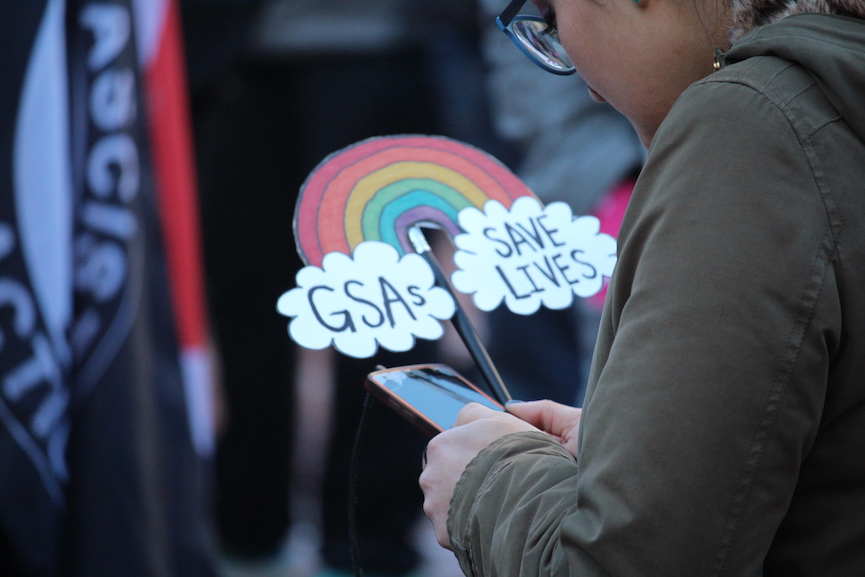As was widely reported yesterday, a judge of the Alberta Court of Queen’s Bench will begin hearing arguments in Medicine Hat today in a legal effort by a social conservative group to upend the Alberta law that prevents schools from informing parents when students join a gay-straight alliance.
The claim by the Justice Centre for Constitutional Freedoms, the group bringing the court challenge on behalf of 25 of religious schools, that GSAs are nothing more than “ideological sexual clubs” certainly captured headlines in Alberta yesterday.
But the legal case it is advancing is arguably designed not so much to protect the rights of parents as to drive gay-straight alliances right out of all Alberta schools, since few students will join GSAs if they are at risk of being outed to their parents.
This befits an organization that is part of a network of social conservative groups that consistently supports the Conservative Party of Canada and its provincial offshoots, and attempts to push the window of acceptable discourse in Canada ever farther to the social conservative right.
Indeed, the law now being challenged by the JCCF was passed last year by Alberta’s NDP government in part in response to statements by United Conservative Party Leader Jason Kenney that he believed schools should be able to inform parents their children have joined GSAs, causing fears for the safety of such students.
The JCCF describes itself on its website as “a voice for freedom in Canada’s courtrooms,” and says its mission is “to defend the constitutional freedoms of Canadians through litigation and education.”
In reality, however, the JCCF only supports certain freedoms. For example, it would support the freedom of religious groups to engage in behaviour many of us would define as discriminating against members of the LGBTQ community, but not necessarily the right to be free from such discrimination.
Its social conservative leanings are quite clear from the types of cases it has championed since it was established in 2010, among them:
- Defending campus anti-abortion groups that have been denied status as clubs at Canadian universities or that engage in actions deemed offensive by other students
- Representing a “men’s rights” group that was denied club status at Ryerson University in Toronto
- Supporting the unsuccessful effort by British Columbia’s evangelical Trinity Western University to force provincial law societies to admit graduates of its law program despite a policy requiring students to live a supposedly Christian lifestyle, as defined by the institution
- Sued the Ottawa Public Library to allow a group to show a video described by opponents as Islamophobic on its premises
- Succeeded in forcing the St. Catherines Public Library in Ontario to distribute with other community newsletters a publication accusing “Apostates and Atheists” of trying “to install their undemocratic rule of terror”
- Defence of physicians who wish to deny access to medical procedures, or even refuse to provide information about them, if they believe they violate their personal religious convictions
- Representing a “human rights advocacy” organization that wanted to make controversial claims about the Islamic religion in transit advertisements in Edmonton
- Legal support for individuals challenging public health insurance so they can have the right to pay extra to jump the queue for health care in Canada
- Support for a Manitoba marriage commissioner who refused to perform weddings for same-sex couples
A significant number of the group’s current cases involve support for anti-abortion groups and individuals, as well as for groups and individuals opposed to efforts to protect the rights of LGBTQ community members.
The group also publishes an annual document it calls a “Campus Freedom Index” that purports to measure the state of freedom of expression on Canadian campuses. The list makes a particular bugbear of student unions at Canadian universities for, among other things, adopting “political positions on issues not directly related to their mandates.”
The JCCF was founded by Calgary lawyer John Carpay, a former Wildrose Party and Reform Party candidate, as well as a former Alberta director of the Canadian Taxpayers Federation.
Carpay is beloved by right-wing publications like the National Post, which provides him with a prominent platform for his social conservative views.
The JCCF’s board and advisors listed on its website include the current president of the CTF, well-known right-wing journalists and academics, associates of market-fundamentalist think tanks, and a University of Calgary professor associated with the so-called Friends of Science.
The inflammatory term “ideological sexual clubs” could have been lifted straight from a tweet by Donald Trump, as befits the JCCF’s right-wing heritage. Unsurprisingly, the JCCF and its work have been endorsed by Rebel Media.
In the case of Alberta school GSAs, it is fair to describe such outlandish terminology as extremist nonsense, intended to obfuscate and not illuminate.
In reality, as the government’s filing in the case states, “GSAs focus on creating a safe space where students can socialize, be themselves, make friends and help other students understand the importance of being respectful to LGBTQ people.”
This post also appears on David Climenhaga’s blog, AlbertaPolitics.ca.
NOTE: References to “ideological sex clubs” in this story have been amended to read “ideological sexual clubs,” the wording used for this inflammatory and inaccurate characterization of school gay-straight alliances in the JCCF’s court filings, which I have been informed were misreported by the Canadian Press.
Image: JMacPherson/Flickr
Like this article? rabble is reader-supported journalism.




